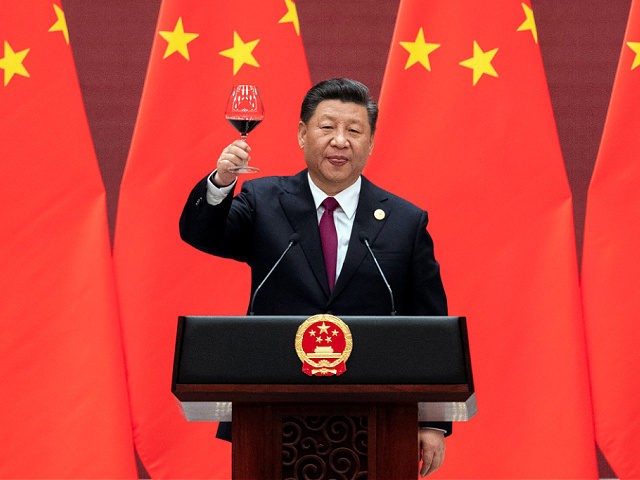Chinese dictator Xi Jinping announced Thursday that China had achieved “complete victory” against poverty, claiming not a single person among the nation’s 1.4 billion people was poor.
Xi asserted that this meant the Communist Party had achieved its “first centenary goal” of creating a “moderately prosperous society” by 2021.
The declaration — similar to a claim in November that China had defeated “extreme poverty” — follows a year in which China reached record levels of exports and greatly outperformed most world economies, in part due to the effects of the Chinese coronavirus pandemic. China also faced, however, significant threats to its food supply in the past year and water shortages in the nation’s south — threats that Beijing has not yet fully eradicated and that call into question the claim that not a single individual in China lived in poverty. The biggest threat to the nation’s food supply last year was extensive flooding in almost the entirety of the Chinese heartland, destroying key crops and leaving farmers with nothing to sell.
Thousands of people reportedly lost their homes and all their belongings as recently as September to floods, raising questions as to how they could not be counted among the poor four months later.
The Chinese state-run publication Global Times branded Xi’s declaration that poverty no longer existed in the country a “great miracle in the human history of poverty reduction.”
“China is expected to declare a moderately prosperous society in all respects in the middle of this year, which means that the country has achieved its first centenary goal on schedule in 2021,” the propaganda outlet explained. “In 2049, China will achieve its second centenary goal of building ‘a modern socialist country that is prosperous, strong, democratic, culturally advanced and harmonious.'”
Xinhua, another Chinese government news agency, offered Communist Party statistics that allegedly proved the end of poverty.
“Over the past eight years, the final 98.99 million impoverished rural residents living under the current poverty line have all been lifted out of poverty. All the 832 impoverished counties and 128,000 impoverished villages have been removed from the poverty list,” Xinhua claimed, asserting “770 million impoverished rural residents have shaken off poverty when calculated in accordance with China’s current poverty line” since the 1970s.
The 832 “impoverished counties” were also allegedly removed from Communist Party statistics in November, when Xi first declared the war on poverty was over. At the time, the Wall Street Journal, questioning the announcement, noted, “a report this year from former World Bank officials said that if a uniform standard of $5.50 a day in income, or around $2,000 a year, were applied, some 373 million or about 27% of the population would be considered in poverty.”
The Chinese government’s metrics differ from many standard world metrics on measuring poverty, such as the one World Bank uses.
China’s economy did enjoy significant successes in 2020, however. Its trade surplus globally hit a record high in light of the fact that many nations almost completely shut down manufacturing in response to the Chinese coronavirus pandemic. China’s was the only major world economy to grow rather than shrink in the past year.
“China is the first major economy worldwide to achieve positive growth, and its GDP in 2020 is expected to step up to a new level of 100 trillion yuan [$15.3 trillion]. China has seen a good harvest in grain production for 17 years in a row,” Xi said in remarks celebrating the news in December.
Xi’s modest boast of a “good” harvest contrasted significantly with his more exuberant celebrations of the Chinese economy but was nonetheless a notable comment given the extensive destruction of Chinese crops through flooding in 2020. Flooding affected 27 of 31 provinces at the peak of the rains and affected over 38 million people. To protect larger structures, particularly the prodigious Three Gorges Dam, Chinese villagers accused the government of deliberately flooding their communities, opening streams into communities to relieve water pressure.
Chinese officials repeatedly denied that the destruction of farmland had affected the nation’s food supply, even as Xi Jinping announced a nationwide campaign to urge people to eat less. The “Clean Plate” campaign, which remains in vigor, is allegedly a response to growing food waste at celebratory events and on social media videos showing people, often thin women, eating large amounts of food for entertainment. The resulting laws from the “Clean Plate” campaign spanned far more than regulating online content, however, imposing limits on how much individuals can eat at large events like weddings and regulating restaurant portions.
“The initiative initially sparked speculation by some media over whether China is in a food crisis,” the Global Times noted last year, refusing to affirm that this was a factor. “Experts say the world indeed faces a food shortage, but for China, the real threat to food security comes more from food wastage than epidemic or floods.”
This week, the Chinese Agriculture Ministry published a future plan to secure national grain supplies. At a press conference announcing the plan, Agriculture Minister Tang Renjian “stressed that the country’s grain supply at times comes under pressure, saying that domestic demand of grain will continue to rise in the long run due to population growth,” according to state media.

COMMENTS
Please let us know if you're having issues with commenting.